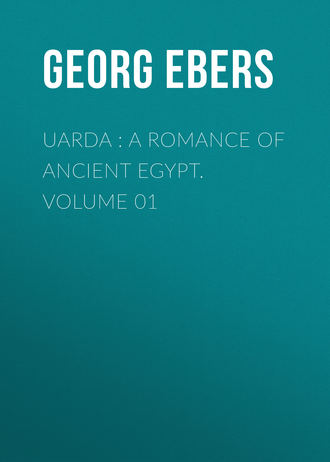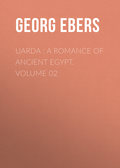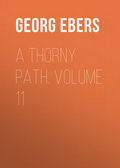
Georg Ebers
Uarda : a Romance of Ancient Egypt. Volume 01
"I would seek a young assistant rather than that blind old man."
"Not at all. I should be glad if he would stay at home, and only let his tongue creep after me like an eel or a slug. Head and heart have nothing to do with his wordy operations, and they go on like an ox treading out corn."
[In Egypt, as in Palestine, beasts trod out the corn, as we learn from many pictures m the catacombs, even in the remotest ages; often with the addition of a weighted sledge, to the runners of which rollers are attached. It is now called noreg.]
"It is true," said Pentaur; "just lately I saw the old man singing out his litanies by a sick-bed, and all the time quietly counting the dates, of which they had given him a whole sack-full."
"He will be unwilling to go to the paraschites, who is poor, and he would sooner seize the whole brood of scorpions yonder than take a piece of bread from the hand of the unclean. Tell him to come and fetch me, and drink some wine. There stands three days' allowance; in this hot weather it dims my sight.
"Does the paraschites live to the north or south of the Necropolis?"
"I think to the north. Paaker, the king's pioneer, will show you the way."
"He!" exclaimed the student, laughing. "What day in the calendar is this, then?
[Calendars have been preserved, the completest is the papyrus Sallier IV., which has been admirably treated by F. Chabas. Many days are noted as lucky, unlucky, etc. In the temples many Calendars of feasts have been found, the most perfect at Medinet Abu, deciphered by Dumich.]
The child of a paraschites is to be tended like a princess, and a leech have a noble to guide him, like the Pharaoh himself! I ought to have kept on my three robes!"
"The night is warm," said Pentaur.
"But Paaker has strange ways with him. Only the day before yesterday I was called to a poor boy whose collar bone he had simply smashed with his stick. If I had been the princess's horse I would rather have trodden him down than a poor little girl."
"So would I," said Pentaur laughing, and left the room to request The second prophet Gagabu, who was also the head of the medical staff of the House of Seti, to send the blind pastophorus
[The Pastophori were an order of priests to which the physicians belonged.]
Teta, with his friend as singer of the litany.
CHAPTER IV
Pentaur knew where to seek Gagabu, for he himself had been invited to the banquet which the prophet had prepared in honor of two sages who had lately come to the House of Seti from the university of Chennu.
[Chennu was situated on a bend of the Nile, not far from the Nubian frontier; it is now called Gebel Silsilch; it was in very ancient times the seat of a celebrated seminary.]
In an open court, surrounded by gaily-painted wooden pillars, and lighted by many lamps, sat the feasting priests in two long rows on comfortable armchairs. Before each stood a little table, and servants were occupied in supplying them with the dishes and drinks, which were laid out on a splendid table in the middle of the court. Joints of gazelle,
[Gazelles were tamed for domestic animals: we find them in the representations of the herds of the wealthy Egyptians and as slaughtered for food. The banquet is described from the pictures of feasts which have been found in the tombs.]
roast geese and ducks, meat pasties, artichokes, asparagus and other vegetables, and various cakes and sweetmeats were carried to the guests, and their beakers well-filled with the choice wines of which there was never any lack in the lofts of the House of Seti.
[Cellars maintain the mean temperature of the climate, and in Egypt are hot Wine was best preserved in shady and airy lofts.]
In the spaces between the guests stood servants with metal bowls, in which they might wash their hands, and towels of fine linen.
When their hunger was appeased, the wine flowed more freely, and each guest was decked with sweetly-smelling flowers, whose odor was supposed to add to the vivacity of the conversation.
Many of the sharers in this feast wore long, snowwhite garments, and were of the class of the Initiated into the mysteries of the faith, as well as chiefs of the different orders of priests of the House of Seti.
The second prophet, Gagabu, who was to-day charged with the conduct of the feast by Ameni—who on such occasions only showed himself for a few minutes—was a short, stout man with a bald and almost spherical head. His features were those of a man of advancing years, but well-formed, and his smoothly-shaven, plump cheeks were well-rounded. His grey eyes looked out cheerfully and observantly, but had a vivid sparkle when he was excited and began to twitch his thick, sensual mouth.
Close by him stood the vacant, highly-ornamented chair of the high- priest, and next to him sat the priests arrived from Chennu, two tall, dark-colored old men. The remainder of the company was arranged in the order of precedency, which they held in the priests' colleges, and which bore no relation to their respective ages.
But strictly as the guests were divided with reference to their rank, they mixed without distinction in the conversation.
"We know how to value our call to Thebes," said the elder of the strangers from Chennu, Tuauf, whose essays were frequently used in the schools,—[Some of them are still in existence]—"for while, on one hand, it brings us into the neighborhood of the Pharaoh, where life, happiness, and safety flourish, on the other it procures us the honor of counting ourselves among your number; for, though the university of Chennu in former times was so happy as to bring up many great men, whom she could call her own, she can no longer compare with the House of Seti. Even Heliopolis and Memphis are behind you; and if I, my humble self, nevertheless venture boldly among you, it is because I ascribe your success as much to the active influence of the Divinity in your temple, which may promote my acquirements and achievements, as to your great gifts and your industry, in which I will not be behind you. I have already seen your high-priest Ameni—what a man! And who does not know thy name, Gagabu, or thine, Meriapu?"
"And which of you," asked the other new-comer, may we greet as the author of the most beautiful hymn to Amon, which was ever sung in the land of the Sycamore? Which of you is Pentaur?"
"The empty chair yonder," answered Gagabu, pointing to a seat at the lower end of the table, "is his. He is the youngest of us all, but a great future awaits him."
"And his songs," added the elder of the strangers. "Without doubt," replied the chief of the haruspices,—[One of the orders of priests in the Egyptian hierarchy]—an old man with a large grey curly head, that seemed too heavy for his thin neck, which stretched forward—perhaps from the habit of constantly watching for signs—while his prominent eyes glowed with a fanatical gleam. "Without doubt the Gods have granted great gifts to our young friend, but it remains to be proved how he will use them. I perceive a certain freedom of thought in the youth, which pains me deeply. Although in his poems his flexible style certainly follows the prescribed forms, his ideas transcend all tradition; and even in the hymns intended for the ears of the people I find turns of thought, which might well be called treason to the mysteries which only a few months ago he swore to keep secret. For instance he says—and we sing— and the laity hear—
"One only art Thou, Thou Creator of beings;
And Thou only makest all that is created.
And again—
He is one only, Alone, without equal;
Dwelling alone in the holiest of holies."
[Hymn to Amon preserved in a papyrus roll at Bulaq, and deciphered by Grehaut and L. Stern.]
Such passages as these ought not to be sung in public, at least in times like ours, when new ideas come in upon us from abroad, like the swarms of locusts from the East."
"Spoken to my very soul!" cried the treasurer of the temple, "Ameni initiated this boy too early into the mysteries."
"In my opinion, and I am his teacher," said Gagabu, "our brotherhood may be proud of a member who adds so brilliantly to the fame of our temple. The people hear the hymns without looking closely at the meaning of the words. I never saw the congregation more devout, than when the beautiful and deeply-felt song of praise was sung at the feast of the stairs."
[A particularly solemn festival in honor of Amon-Chem, held in the temple of Medinet-Abu.]
"Pentaur was always thy favorite," said the former speaker. "Thou wouldst not permit in any one else many things that are allowed to him. His hymns are nevertheless to me and to many others a dangerous performance; and canst thou dispute the fact that we have grounds for grave anxiety, and that things happen and circumstances grow up around us which hinder us, and at last may perhaps crush us, if we do not, while there is yet time, inflexibly oppose them?"
"Thou bringest sand to the desert, and sugar to sprinkle over honey," exclaimed Gagabu, and his lips began to twitch. "Nothing is now as it ought to be, and there will be a hard battle to fight; not with the sword, but with this—and this." And the impatient man touched his forehead and his lips. "And who is there more competent than my disciple? There is the champion of our cause, a second cap of Hor, that overthrew the evil one with winged sunbeams, and you come and would clip his wings and blunt his claws! Alas, alas, my lords! will you never understand that a lion roars louder than a cat, and the sun shines brighter than an oil-lamp? Let Pentuar alone, I say; or you will do as the man did, who, for fear of the toothache, had his sound teeth drawn. Alas, alas, in the years to come we shall have to bite deep into the flesh, till the blood flows, if we wish to escape being eaten up ourselves!"
"The enemy is not unknown to us also," said the elder priest from Chennu, "although we, on the remote southern frontier of the kingdom, have escaped many evils that in the north have eaten into our body like a cancer. Here foreigners are now hardly looked upon at all as unclean and devilish."—["Typhonisch," belonging to Typhon or Seth.—Translator.]
"Hardly?" exclaimed the chief of the haruspices; "they are invited, caressed, and honored. Like dust, when the simoon blows through the chinks of a wooden house, they crowd into the houses and temples, taint our manners and language;
[At no period Egyptian writers use more Semitic words than during the reigns of Rameses II. and his son Mernephtah.]
nay, on the throne of the successors of Ra sits a descendant—"
"Presumptuous man!" cried the voice of the high-priest, who at this instant entered the hall, "Hold your tongue, and be not so bold as to wag it against him who is our king, and wields the sceptre in this kingdom as the Vicar of Ra."
The speaker bowed and was silent, then he and all the company rose to greet Ameni, who bowed to them all with polite dignity, took his seat, and turning to Gagabu asked him carelessly:
"I find you all in most unpriestly excitement; what has disturbed your equanimity?"
"We were discussing the overwhelming influx of foreigners into Egypt, and the necessity of opposing some resistance to them."
"You will find me one of the foremost in the attempt," replied Ameni. "We have endured much already, and news has arrived from the north, which grieves me deeply."
"Have our troops sustained a defeat?"
"They continue to be victorious, but thousands of our countrymen have fallen victims in the fight or on the march. Rameses demands fresh reinforcements. The pioneer, Paaker, has brought me a letter from our brethren who accompany the king, and delivered a document from him to the Regent, which contains the order to send to him fifty thousand fighting men: and as the whole of the soldier-caste and all the auxiliaries are already under arms, the bondmen of the temple, who till our acres, are to be levied, and sent into Asia."
A murmur of disapproval arose at these words. The chief of the haruspices stamped his foot, and Gagabu asked:
"What do you mean to do?"
"To prepare to obey the commands of the king," answered Ameni, "and to call the heads of the temples of the city of Anion here without delay to hold a council. Each must first in his holy of holies seek good counsel of the Celestials. When we have come to a conclusion, we must next win the Viceroy over to our side. Who yesterday assisted at his prayers?"
"It was my turn," said the chief of the haruspices.
"Follow me to my abode, when the meal is over." commanded Ameni. "But why is our poet missing from our circle?"
At this moment Pentaur came into the hall, and while he bowed easily and with dignity to the company and low before Ameni, he prayed him to grant that the pastophorus Teta should accompany the leech Nebsecht to visit the daughter of the paraschites.
Ameni nodded consent and exclaimed: "They must make haste. Paaker waits for them at the great gate, and will accompany them in my chariot."
As soon as Pentaur had left the party of feasters, the old priest from Chennu exclaimed, as he turned to Ameni:
"Indeed, holy father, just such a one and no other had I pictured your poet. He is like the Sun-god, and his demeanor is that of a prince. He is no doubt of noble birth."
"His father is a homely gardener," said the highpriest, "who indeed tills the land apportioned to him with industry and prudence, but is of humble birth and rough exterior. He sent Pentaur to the school at an early age, and we have brought up the wonderfully gifted boy to be what he now is."
"What office does he fill here in the temple?"
"He instructs the elder pupils of the high-school in grammar and eloquence; he is also an excellent observer of the starry heavens, and a most skilled interpreter of dreams," replied Gagabu. "But here he is again. To whom is Paaker conducting our stammering physician and his assistant?"
"To the daughter of the paraschites, who has been run over," answered Pentaur. "But what a rough fellow this pioneer is. His voice hurts my ears, and he spoke to our leeches as if they had been his slaves."
"He was vexed with the commission the princess had devolved on him," said the high-priest benevolently, "and his unamiable disposition is hardly mitigated by his real piety."
"And yet," said an old priest, "his brother, who left us some years ago, and who had chosen me for his guide and teacher, was a particularly loveable and docile youth."
"And his father," said Ameni, was one of the most superior energetic, and withal subtle-minded of men."
"Then he has derived his bad peculiarities from his mother?"
"By no means. She is a timid, amiable, soft-hearted woman."
"But must the child always resemble its parents?" asked Pentaur. "Among the sons of the sacred bull, sometimes not one bears the distinguishing mark of his father."
"And if Paaker's father were indeed an Apis," Gagabu laughing, "according to your view the pioneer himself belongs, alas! to the peasant's stable."
Pentaur did not contradict him, but said with a smile:
"Since he left the school bench, where his school-fellows called him the wild ass on account of his unruliness, he has remained always the same. He was stronger than most of them, and yet they knew no greater pleasure than putting him in a rage."
"Children are so cruel!" said Ameni. "They judge only by appearances, and never enquire into the causes of them. The deficient are as guilty in their eyes as the idle, and Paaker could put forward small claims to their indulgence. I encourage freedom and merriment," he continued turning to the priests from Cheraw, "among our disciples, for in fettering the fresh enjoyment of youth we lame our best assistant. The excrescences on the natural growth of boys cannot be more surely or painlessly extirpated than in their wild games. The school-boy is the school-boy's best tutor."
"But Paaker," said the priest Meriapu, "was not improved by the provocations of his companions. Constant contests with them increased that roughness which now makes him the terror of his subordinates and alienates all affection."
"He is the most unhappy of all the many youths, who were intrusted to my care," said Ameni, "and I believe I know why,—he never had a childlike disposition, even when in years he was still a child, and the Gods had denied him the heavenly gift of good humor. Youth should be modest, and he was assertive from his childhood. He took the sport of his companions for earnest, and his father, who was unwise only as a tutor, encouraged him to resistance instead of to forbearance, in the idea that he thus would be steeled to the hard life of a Mohar."
[The severe duties of the Mohar are well known from the papyrus of Anastasi I. in the Brit. Mus., which has been ably treated by F. Chabas, Voyage d'un Egyptien.]
"I have often heard the deeds of the Mohar spoken of," said the old priest from Chennu, "yet I do not exactly know what his office requires of him."
"He has to wander among the ignorant and insolent people of hostile provinces, and to inform himself of the kind and number of the population, to investigate the direction of the mountains, valleys, and rivers, to set forth his observations, and to deliver them to the house of war,
[Corresponding to our minister of war. A person of the highest importance even in the earliest times.]
so that the march of the troops may be guided by them."
"The Mohar then must be equally skilled as a warrior and as a Scribe."
"As thou sayest; and Paaker's father was not a hero only, but at the same time a writer, whose close and clear information depicted the country through which he had travelled as plainly as if it were seen from a mountain height. He was the first who took the title of Mohar. The king held him in such high esteem, that he was inferior to no one but the king himself, and the minister of the house of war."
"Was he of noble race?"
"Of one of the oldest and noblest in the country. His father was the noble warrior Assa," answered the haruspex, "and he therefore, after he himself had attained the highest consideration and vast wealth, escorted home the niece of the King Hor-em-lieb, who would have had a claim to the throne, as well as the Regent, if the grandfather of the present Rameses had not seized it from the old family by violence."







